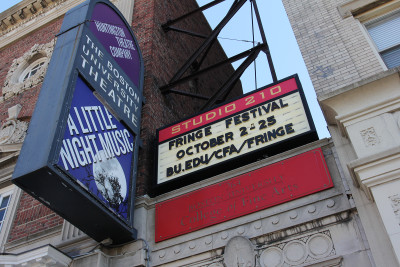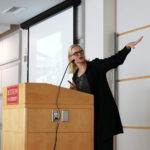
Boston University’s School of Theatre, part of the College of Fine Arts, reaffirmed on Friday its decision to sell the BU Theatre and its two connected buildings after the end of the partnership between BU and the Huntington Theatre Company, the two announced Wednesday.
According to a joint press release issued Wednesday by BU and Huntington, the company “needs a more modern theatre in which to present its large-scale productions as well as function space for its patrons. BU needs to better serve its theatre arts students.”
BU’s Space Planning and Capital Expenditures (SPACE) Committee will be in charge of plans to build teaching, design, production and black box facilities on the Charles River Campus, instead.
“A proximal, modern facility opens the door to not just new space, but to new ideas, progressive mindsets, and innovative approaches to the art forms,” CFA Interim Dean Lynne Allen wrote in a statement Friday.
Allen said the SPACE Committee is expected to hold a public discussion next spring to garner planning insights, and the university is committed to having the facilities ready for students before the 2017-2018 academic year. The new facilities, however, will not be a full proscenium theatre.
“It is simply too cost prohibitive,” Allen said.
As an alternative, the School of Theatre will be considering other performance venues in Boston for large-scale productions.
For now, activities at the BU Theatre will remain unchanged. BU spokesperson Colin Riley said CFA and Huntington will continue to run their productions at least until June 30, 2017.
Founded in 1982 by BU, Huntington has been “part of the training program” for BU students, said Michael Maso, Huntington Theatre Company’s managing director.
“We train young people either formally or by mentorship or by working side-by-side with them,” Maso said.
The Huntington is still considering alternative spaces for production, including another newly renovated theatre on Huntington Avenue. Despite the change of place, Maso said Huntington feels no significant change to the work it does.
“We’re going to be able to sustain [our artistic ambitions] no matter how this plays out,” Maso said.
Several theater students in CFA expressed mixed feelings upon the end of partnership between BU and Huntington.
Maya Kherani, a postgraduate student in CFA’s Opera Institute, said she has faith in BU’s faculty that they will find a new space for CFA students that will match the Huntington’s facilities.
“The Huntington was nice because it was almost [a 1000 seat hall] and acoustically it was really great to sing in and to have the orchestra pit,” she said. “So I think to find a suitable place like that will be a challenge but I know that the faculty are involved in that conversation, and I’m pretty confident that they’ll come up with a solution to it.
Kherani said she hopes CFA will uphold its standards while transitioning into a new space.
“I hope that we can not only meet that quality that we’ve set but continue to improve and keep our reputation of being a very foremost performance school,” she said. “I also hope that the School of Music gets proper representation within the dialogue with the School of Theatre in establishing a new space.”
Starr Clark, a sophomore in the School of Theatre, said she feels optimistic despite the end of partnership.
“It’s really sad to see that partnership end because it’s been so beneficial to everyone involved,” Clark said. “But I’m just so excited for the new prospect it offers for both the Huntington Theatre Company and for the BU School of Theatre.”
Clark said she doesn’t think of the facility relocation plan as a disadvantage, just an adjustment.
“It will affect us, but I don’t think it will be a negative change just because so many other things will change,” she said. “I think there will be a lot more unity, which is really exciting. We’ll also have new facilities, we’ll have new opportunities, we’ll have new audiences to show. I’m just so excited about it.”
David Castillo, a junior in the School of Theatre, said although students’ performance spaces will change, the culture of CFA won’t, and CFA will continue to give students the space needed to fulfill their needs as actors.
“I think as BU School of Theatre continues to tackle different work and different types of work that doesn’t traditionally exist in the American theater canon, they will build a facility that will allow them to do that,” he said. “I don’t particularly know what that means yet … but I trust that the program will build a facility that will allow it to produce different types of works.”




